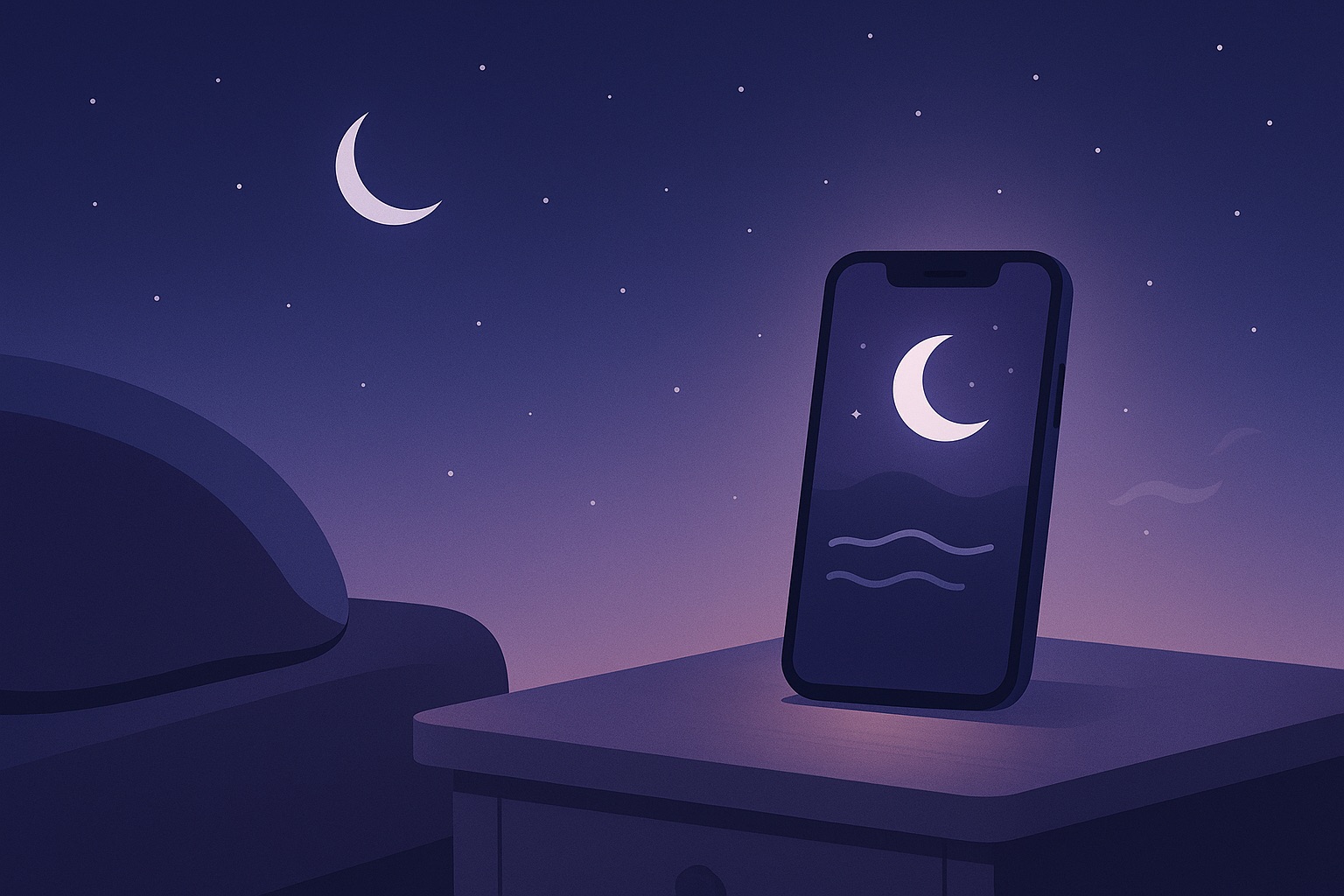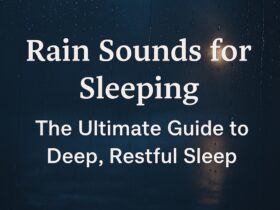Best Sleeping Apps in 2025: The Top 8 Apps for Better Sleep (and Why Oli Sleep Leads)
Introduction
Everyone deserves a good night’s sleep. Yet in today’s world filled with stress, blue light, and endless mental noise, falling asleep and staying asleep can feel impossible.
That is where sleeping apps come in. They guide you, calm your mind, track your sleep, and help you drift off gently. But with so many options, finding the best one can be confusing.
In this article, we will cover:
- What a sleeping app is
- The most important features to look for
- The best sleeping apps of 2025, ranked and reviewed
- Why Oli Sleep (olisleep.com) is our number one choice
- FAQs to help you pick the right one
What Is a Sleeping App?
A sleeping app is a digital tool designed to help you fall asleep faster, sleep deeper, and wake up feeling more refreshed.
Different apps focus on different goals:
- Relaxation: calming audio, guided meditations, bedtime stories
- Tracking: recording your sleep stages and cycles
- Smart alarms: waking you at the lightest sleep phase
- Behavioral coaching: improving your bedtime routine
- Personalization: adapting to your habits and preferences
The best sleeping apps combine several of these features in a way that feels easy and comforting, not overwhelming.
The Best Sleeping Apps in 2025
Below is our updated list of the top eight sleeping apps for 2025, including both established names and innovative newcomers.
1. Oli – The AI Sleep Companion You Will Actually Love
Website: olisleep.com
Oli Sleep is not just another meditation app. It is a calming AI sleep companion designed to help you relax and drift off peacefully.
Key Features
- Personalized AI bedtime stories that are soothing and original, tailored to your mood or favorite setting such as forest, ocean, or stars.
- Relaxing soundscapes that include ambient sounds like rain, waves, or fireplaces.
- Companion-style interaction that listens, responds gently, and helps you feel calmer, not just entertained.
- Simple nightly routine reminders that prompt you to unwind, breathe, and prepare for sleep.
Why It Is Number One
Unlike other sleep apps that focus on data or meditation, Oli
Sleep focuses on emotional comfort. It feels like having a kind, intelligent friend by your bedside, guiding you softly into rest.
Visit olisleep.com to try it free and experience the difference yourself.
2. Calm
Calm is one of the most popular relaxation and meditation apps in the world. Its sleep section features bedtime stories, relaxing music, breathing programs, and celebrity narrations.
Highlights
- Extensive library of sleep stories and guided meditations
- Beautiful interface and audio quality
- Great for stress, anxiety, and mindfulness
Considerations
- Premium subscription required for most content
- Less personalization compared to newer AI-based apps
3. Headspace
Headspace started as a meditation app and has grown into a full wellness platform. Its sleep section includes “Sleepcasts,” relaxing music, and wind-down sessions.
Highlights
- World-class design and production quality
- Excellent onboarding for beginners
- Short, guided meditations and mindfulness tools
Considerations
- Some content feels repetitive
- Subscription needed for premium features
4. BetterSleep (formerly Relax Melodies)
BetterSleep is ideal for anyone who loves ambient sounds. You can mix and match rain, wind, waves, and melodies to create your own perfect soundscape.
Highlights
- Huge sound library
- Sleep stories, guided meditations, and ASMR content
- Sleep recorder and tracking tools
Considerations
- Interface can feel busy
- Some advanced features require a subscription
5. Sleep Cycle
Sleep Cycle focuses on tracking your sleep and helping you wake up at the right time. It uses your phone’s microphone or accelerometer to monitor your sleep phases.
Highlights
- Smart alarm clock wakes you during light sleep
- Detailed sleep analytics
- Integrates with Apple Health and wearables
Considerations
- Fewer relaxation features
- More data-driven, less soothing experience
6. Stellar Sleep
Stellar Sleep offers sound-based relaxation and meditation. It focuses on improving the environment for better rest.
Highlights
- Calming soundscapes and soft tones
- Simple interface and lightweight app
Considerations
- Smaller library than Calm or BetterSleep
- Limited personalization features
7. Sleep Reset
Sleep Reset combines behavioral science and coaching with digital convenience. It helps you build sustainable sleep habits.
Highlights
- Structured, CBT-based sleep improvement program
- Personalized plan created by sleep experts
- Focus on long-term sleep health
Considerations
- Feels more clinical and structured
- Less entertainment and audio variety
8. Pillow
Pillow is designed for Apple users who want smart tracking. It pairs with Apple Watch and provides deep insights into your sleep.
Highlights
- Accurate tracking and recording
- Smart alarm to wake you at the right time
- Works seamlessly across Apple devices
Considerations
- iOS only
- Minimal relaxation or mindfulness content
Comparison Table: Best Sleep Apps
| App | Focus Area | Tracking | Stories or Audio | AI or Personalization | Price Model |
|---|---|---|---|---|---|
| Oli Sleep | AI companionship and relaxation | Coming soon | ✔️ Dynamic | ✔️ High | Freemium |
| Calm | Meditation and content | Basic | ✔️ Large library | ✖️ | Freemium |
| Headspace | Mindfulness and meditation | Basic | ✔️ | ✖️ | Freemium |
| BetterSleep | Sounds and mixing | ✔️ | ✔️ | ✖️ | Freemium |
| Sleep Cycle | Tracking and alarms | ✔️ Excellent | ✖️ | ✖️ | Freemium |
| Stellar Sleep | Relaxing audio | ✖️ | ✔️ | ✖️ | Freemium |
| Sleep Reset | Coaching and CBT | ✔️ | ✖️ | ✖️ | Subscription |
| Pillow | Apple integration | ✔️ | ✖️ | ✖️ | Freemium |
How to Choose the Right Sleep App
Here are a few questions to help you find your ideal match:
- Do you want help relaxing or tracking?
- For pure relaxation: Oli Sleep, Calm, BetterSleep
- For data and analytics: Sleep Cycle, Pillow
- Do you prefer an emotional, human-like experience or data insights?
- For companionship and comfort: Oli Sleep
- For measurable progress: Sleep Reset or Sleep Cycle
- How much do you want to spend?
- Start with free trials, then upgrade once you find one that works consistently.
- Do you want to integrate with wearables?
- Choose Pillow or Sleep Cycle for Apple Watch or phone tracking.
Why Oli Sleep Stands Apart
While most sleep apps act as tools, Oli Sleep feels like a friend: gentle, consistent, and emotionally intelligent. It does not just give you content, it listens, adapts, and grows with you.
Oli’s mission is simple: to make bedtime a peaceful, personal ritual again.
Try it today at olisleep.com and see how different your nights can feel.
FAQs About Sleep Apps
Do sleep apps really work?
Yes. They can calm your nervous system, improve bedtime habits, and reduce anxiety. Consistency is key.
Are sleep apps safe to use every night?
Absolutely. Just keep brightness low and use dark mode to avoid disrupting melatonin production.
What is the best free sleep app?
Many offer strong free versions. Oli Sleep provides free access to AI stories and calming soundscapes so you can start relaxing right away.
Which app helps the most with insomnia?
If you have chronic insomnia, consider pairing a behavioral app like Sleep Reset with a relaxation app like Oli Sleep for the best results.
Can sleep apps replace therapy or medication?
No. They are supportive wellness tools, not medical devices. Always consult a professional for persistent sleep disorders.
Do I need headphones to use a sleep app?
Not always. Soft background speakers or even your phone’s built-in sound can work fine. Keep the volume low.
Final Thoughts
The best sleeping app is not the one with the most features. It is the one you will actually use every night.
For people who want something personal, comforting, and smart, Oli Sleep (olisleep.com) is the clear leader. Its AI companion experience and soothing storytelling set it apart from every other sleep app on this list.
If you have been searching for a gentle, modern way to unwind, try Oli Sleep tonight and start sleeping better naturally.
Understanding the Science Behind Sleep Apps
Sleep is one of the most essential functions of the human body. It impacts memory, focus, immunity, mood, and even lifespan. Yet millions of people struggle to get enough quality sleep. That is why the rise of sleep apps makes sense: they combine science, sound, and psychology to help people rest better.
A well-designed sleep app works on multiple levels:
- Physiological: Calming the nervous system through breathing and slow rhythms.
- Psychological: Distracting the mind from anxious thoughts.
- Environmental: Masking background noise and promoting darkness, stillness, and consistency.
When you open an app like Oli Sleep, you are not just listening to sounds. You are engaging in a behavioral loop that signals to your body, “It’s time to relax now.” Over time, this creates a strong sleep association that improves your bedtime habits.
Types of Sleeping Apps
Not all sleep apps are built for the same purpose. Here are the main categories and how they can help you:
1. Relaxation and Meditation Apps
These are the most common. They use audio, guided meditations, and mindfulness to help you unwind. Calm, Headspace, and Oli Sleep fall into this category.
2. Sleep Sound and ASMR Apps
These apps let you mix or play ambient sounds such as rain, ocean waves, forest sounds, or gentle background hums. BetterSleep is a classic example.
3. Sleep Tracking Apps
Apps like Sleep Cycle and Pillow use your phone’s sensors or a smartwatch to track when you fall asleep, how long you sleep, and how often you wake up. They help you identify trends and improve your sleep hygiene.
4. Cognitive Behavioral (CBT) Apps
Sleep Reset and similar apps focus on long-term sleep improvement using methods inspired by cognitive behavioral therapy for insomnia (CBT-I).
5. Hybrid or AI-Powered Apps
The newest generation combines multiple methods. Oli Sleep, for example, uses AI to adapt stories and soundscapes to your mood and preferences. This creates a personalized sleep ritual that feels fresh every night.
The Role of Sound in Better Sleep
Sound plays a huge role in relaxation. The human brain responds to rhythm and repetition, which is why gentle noises can help you drift off.
- White noise masks sudden changes in the environment, like a dog barking or traffic outside.
- Pink noise (deeper and softer than white noise) can improve deep sleep and memory consolidation.
- Nature sounds like rain, wind, or waves trigger evolutionary feelings of safety and calm.
- Slow ambient music can synchronize your heart rate with relaxing rhythms.
Apps such as Oli Sleep, BetterSleep, and Calm take advantage of these effects to create an immersive environment that encourages the body and mind to let go.
How AI Is Transforming the Sleep App Market
AI has become a major innovation driver in sleep and wellness apps. Instead of offering static playlists, AI allows real-time adaptation to the user.
Here is what AI can do in sleep apps like Oli Sleep:
- Personalized storytelling: AI can craft a bedtime story that changes based on the user’s preferences. If you like oceans and stars, Oli Sleep can generate a story about floating across calm waves under a night sky.
- Smart suggestions: The app can learn what works best for you and recommend specific sounds, stories, or breathing patterns.
- Mood detection (optional): Future features could sense stress levels through text or tone and adapt the response.
- Continuous improvement: The AI model improves as more users interact with it, making recommendations smarter and stories more natural.
This dynamic approach keeps the experience fresh and engaging, which is key to retention and satisfaction.
The Psychology of Sleep Apps
Beyond the technical side, sleep apps address a deep psychological need: safety and consistency. For many people, anxiety or racing thoughts prevent relaxation.
Listening to a calm voice, predictable rhythm, or gentle story offers structure to the brain. It shifts attention away from worries and toward sensory comfort.
The presence of an “AI companion” such as Oli can feel emotionally supportive. It is not just about technology but about feeling cared for — a factor that can significantly improve sleep quality for people who feel lonely or stressed.
Tips for Using Sleep Apps Effectively
Even the best sleep app will not help if used incorrectly. Here are some practical tips to make the most of your nightly experience:
- Start a nightly ritual: Use your sleep app around the same time every night. Consistency trains your body to expect rest.
- Dim your screen: Keep brightness at the lowest level or use dark mode. Light suppresses melatonin.
- Avoid multitasking: Do not scroll social media or answer messages while using your app. Treat it as sacred calm time.
- Combine with breathing: Use deep slow breaths to enhance relaxation effects.
- Experiment: Try different stories, sounds, or volumes until you find what soothes you most.
If you use Oli Sleep, for example, you can tell Oli what kind of mood you are in, and it will adjust the story tone accordingly.
The Benefits of Using a Sleep App
When used consistently, sleeping apps can have real benefits:
- Faster sleep onset: Calming sounds and guided focus help you fall asleep more quickly.
- Improved sleep quality: You spend more time in deep, restorative sleep phases.
- Reduced anxiety: Replacing intrusive thoughts with guided relaxation can quiet the mind.
- Better morning mood: Regular, quality sleep improves energy and mental clarity.
- Habit formation: The ritual of using the app signals your body that it is bedtime.
For many users, the difference becomes noticeable within one week.
Sleep Apps vs. Traditional Sleep Aids
Traditional methods like pills or supplements can work, but they often treat symptoms rather than causes. Sleep apps approach rest from a behavioral and psychological angle.
| Method | Pros | Cons |
|---|---|---|
| Sleep Apps | Non-invasive, habit-forming, natural | Requires consistency |
| Supplements | Can help short-term | Tolerance, side effects |
| Medication | Medical supervision, strong effect | Risk of dependence |
| Therapy | Addresses root causes | Expensive and time-consuming |
For many people, the best results come from combining behavioral support (like Oli Sleep) with healthy habits: exercise, diet, and reduced screen exposure before bed.
Common Mistakes When Using Sleep Apps
To get the best results, avoid these common mistakes:
- Using too many apps at once. Stick to one or two. Switching constantly prevents habit formation.
- Screen brightness too high. Bright light can wake the brain even during relaxing audio.
- Listening to overly stimulating sounds. Avoid lyrics or fast rhythms.
- Expecting instant results. Give yourself at least a week of consistent use.
- Ignoring environment. Combine app use with good sleep hygiene: cool room, dark curtains, no caffeine after lunch.
Remember that an app is a tool, not magic. But when used right, it becomes a nightly ally.
Data Privacy in Sleep Apps
When using a sleep app, you might wonder what happens to your data. Responsible developers design privacy into the product.
Oli Sleep, for example, focuses on creating a private, safe environment. The app can store data locally or in encrypted form. It does not need to collect medical information to provide value.
If you are evaluating any app, check:
- What data is collected (sleep times, mood, audio usage).
- Whether it is shared with third parties.
- How long it is stored.
- Whether you can delete it easily.
Transparency builds trust, which is essential for wellness technology.
The Future of Sleep Apps
The future of sleep technology looks exciting. Here are trends you can expect in the next few years:
- AI companions as nightly coaches: More apps will use conversation-based interfaces like Oli Sleep to create personalized bedtime routines.
- Wearable integration: Sleep apps will connect with smart rings and watches for deeper data.
- Adaptive soundscapes: Real-time adjustments based on environment noise and sleep stage.
- Mental health integration: Combined support for anxiety, mindfulness, and relaxation.
- Augmented reality (AR) relaxation: Visual experiences to reduce stress before sleep.
As AI improves, sleep apps will move from “tools” to “companions” that truly understand user preferences.
Sleep Hygiene: The Foundation of Rest
Even the best technology cannot replace healthy sleep hygiene. Here are the habits experts recommend:
- Keep a consistent bedtime and wake-up time, even on weekends.
- Limit caffeine and alcohol, especially in the evening.
- Reduce screen exposure one hour before bed.
- Keep your room cool, dark, and quiet.
- Exercise regularly, but not too close to bedtime.
- Use your sleep app as part of a relaxing bedtime ritual.
Apps like Oli Sleep reinforce these behaviors by reminding you to prepare for bed at the same time each night.
How to Integrate Sleep Apps into Daily Life
A sleep app works best when integrated into your daily rhythm, not treated as an occasional aid.
Here is a simple routine you can follow:
- Evening wind-down (9:30 PM): Dim lights, close screens, and open your sleep app.
- Relaxation period (9:45 PM): Choose a soundscape or story that matches your mood.
- Bedtime (10:00 PM): Lie down and focus on breathing while the audio plays.
- Morning reflection: Log how you feel and adjust the next night’s plan.
By repeating this pattern, you create an association between your app, your environment, and deep rest.
Expert Insights on Sleep Apps
Sleep experts often emphasize that while sleep apps cannot replace medical treatment for disorders, they offer a practical, scalable way to improve public sleep hygiene.
Behavioral psychologist Dr. Sara Ballantine notes:
“Sleep apps create an important psychological anchor. When the brain associates a certain sound or tone with relaxation, it starts preparing for rest automatically.”
This is why Oli Sleep’s combination of storytelling and gentle soundscapes is so effective. It gives the brain a consistent cue while adding emotional comfort.
The Business of Sleep: Why It Is Growing
The global sleep app market is projected to surpass $10 billion by 2030. Rising stress, screen use, and mental health awareness are driving factors.
But there is still space for differentiation. Most large brands target broad audiences. That leaves room for niche products like Oli Sleep, which focuses on emotional connection and AI personalization.
This personal, human-like experience is what will keep users engaged and willing to pay for premium features.
Combining Sleep Apps with Other Wellness Tools
Many users benefit from pairing a sleep app with complementary tools such as:
- Meditation apps for daytime mindfulness
- Fitness trackers for physical activity data
- Smart lighting systems that mimic sunset and sunrise patterns
- Aromatherapy diffusers that release calming scents
The key is integration. Oli Sleep, for instance, can easily become the nightly hub that connects your digital wellness ecosystem.
User Testimonials and Real-World Results
While early in its journey, users of AI-driven apps like Oli Sleep often report:
- Falling asleep faster within three to five nights
- Feeling calmer before bed
- Using fewer external distractions like YouTube or TV to relax
- Reduced anxiety and improved consistency in bedtime routines
These small daily improvements add up to significant lifestyle benefits over time.
Final Thoughts on the Evolution of Sleeping Apps
The journey from simple sound apps to intelligent companions reflects how technology is evolving to serve human well-being.
Oli Sleep represents this new generation: private, emotionally intelligent, and beautifully simple. It does not overwhelm users with data; it comforts them with calm.
As the world grows busier, tools that bring peace and rest will become more valuable. Sleep apps are not just about technology — they are about restoring balance.
If you are searching for a way to make bedtime something you look forward to again, visit olisleep.com and experience the future of sleep today.
Sweet dreams. 🌙






Leave a Reply